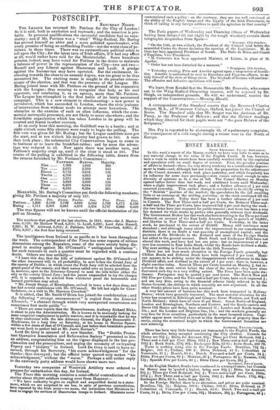POSTSCRIPT.
SATURDAY NIGHT.
THE LaAOUE has returned Mr. Pattison for the City of Loudon So it is said, both in exultation and reproach ; and the assertion is pro- bable. In personal qualifications the successful candidate had no supe- riority; and if Mr. Pattison was a "tried" Whig-Radical, Mr. Baring has proved himself an abler and a more polished speechmaker, with every promise of being an unflinching Peelite-not the worst class of po- ticians, in these times. There was no extraordinary political crisis to tell upon the City ; for the latest turn of Irish affairs, if it had any effect at all, would rather have told for the Ministerialist. Some humdrum persons, indeed, may have voted for Pattison in the desire to maintain a balance of power in the representation of the City-two and two- Russell and any Liberal against Masterman and Lyall. A grudge against the Income-tax may have operated. But the excitement, in- creasing towards the close to an unusual degree, was too great to be thus accounted for. The exciting cause is sought in the peculiar circum- stance of the election, and that was the presence of the League. Mr. Baring joined issue with Mr. Pattison on the ground of his connexion with the League; thus seeming to recognize that body as his real opponent, and combating it, as an agency, more than Mr. Pattison. The League has triumphed in the first battle of its lately announced campaign. This is a new element in electioneering: a new power is introduced, which has succeeded in London, where the civic jealousy of intervention from without made its attempt most hazardous. The obstacles to the exercise of such an alien influence, which the com- mercial metropolis presented, are not likely to occur elsewhere ; and the formidable organization which has taken London in its grasp will be courted and feared in other contests.
At an early hour this morning, the Guildhall was in a bustle ; and at eight o'clock some fifty electors were ready to begin the polling. The first vote was given for Mr. Baring ; but the League candidate soon got the start, and at ten o'clock his majority had grown to 345. A turn then took place : the substantial City Conservatives began to come in to business or to leave the breakfast-tables ; and by noon the advan- tage was reduced to 43. Now again there was another turn, and Pattison's majority crept up, until at the close it stood at 201. The coarse of the polling is exhibited in the following table, drawn from the returns furnished by Mr. Pattison's Committee- PATTISON. BARING. Majority.
266 345 136 43 69 121 159 201 Meanwhile, Mr. Baring's Committee put forth the following numbers; giving Mr. Pattison a majority of only 127.
At Nine. Ten. Eleven. Twelve. One. Two. Three. Four.
Pattison... 1,358 2,549 3,729 4,682 5,342 5,799 6,175 6,530 Baring ... 1,111 2,301 3,661 4,678 5,334 5,737 6,068 6,403 The true figures will not be known until the official declaration of the poll on Monday.
The numbers that polled at the last election, in 1841, were-for J. Master- man, 6,339; Sir Mathew Wood, 6,315; G. 401, 6,290; Lord John Russell, 6,221; M. W. Attwood, 6,212; J. Pattison, 6,070; W. Crawford, 6,065; J. Pirie, 6,017; the first four being returned.
Nine 1,308 1,042 Ten 2,655 2,310 Eleven 3,752 3,616 Twelve 4,706 4,663 One 5,371 5,302 Two 5,820 5,699 Three 6,203 6,044 Four 6,535 6,334


























 Previous page
Previous page